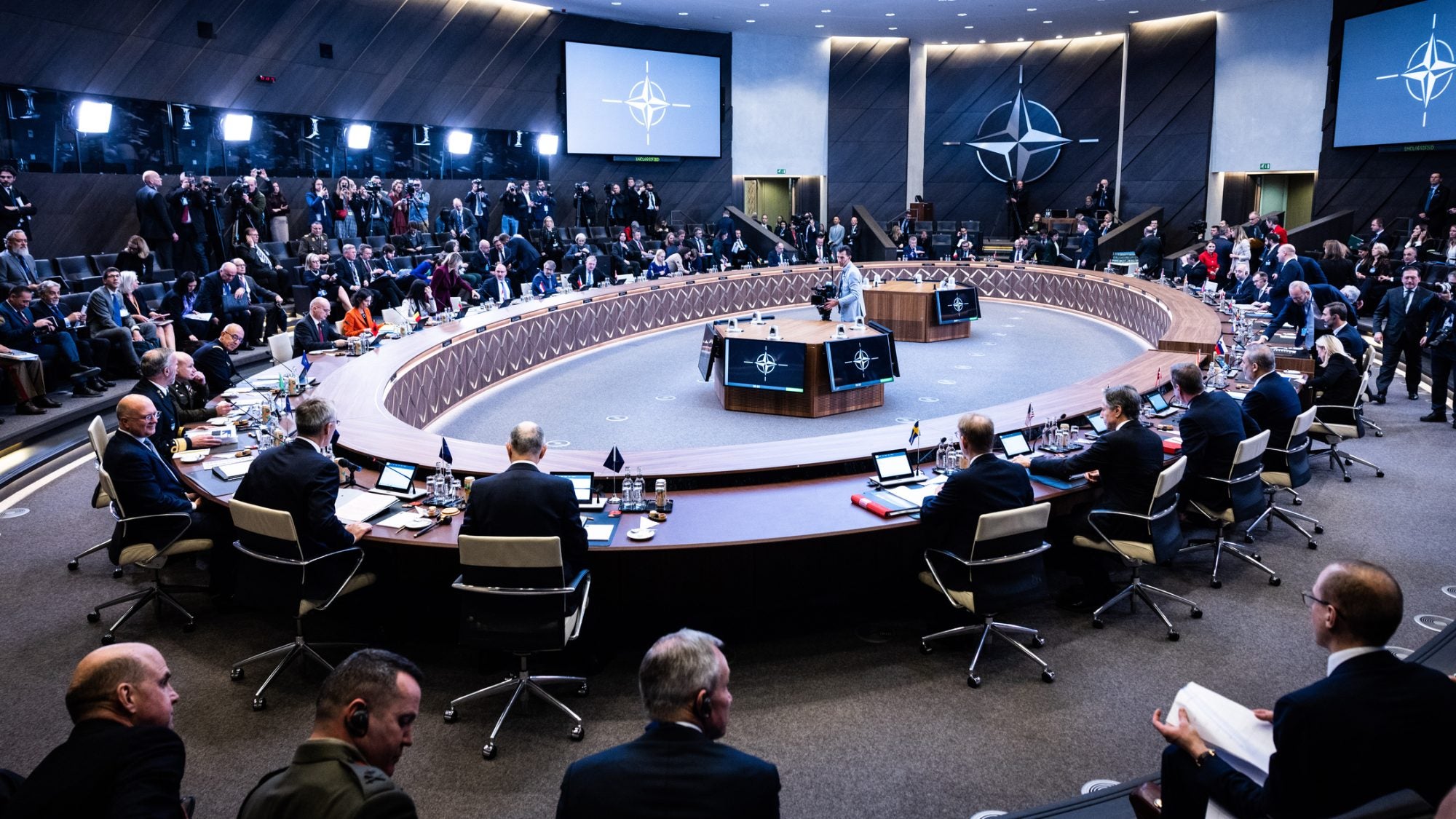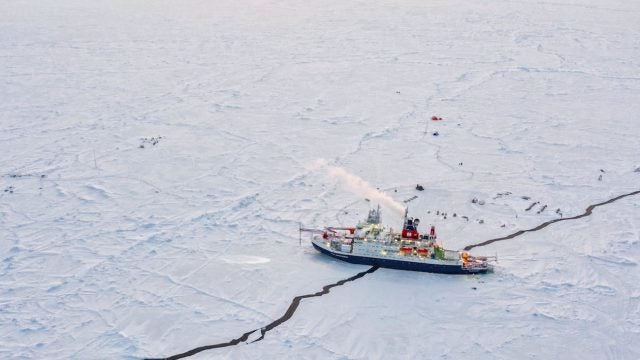
Title: The Looming Danger of Transatlantic Disunity
The specter of transatlantic disunity has returned. The formidable success of the US and its allies in achieving unity and cohesion in the aftermath of Russia’s full-scale invasion of Ukraine has become endangered as fatigue, disagreements between allies, and Donald Trump’s long shadow set in. If the “relative harmony” of transatlantic relations were to continue declining, the consequences for both the essence of the Atlantic alliance and the future of European security would be dire, endangering transatlantic values like democracy and the rule of law. Concrete policy action, such as keeping the public informed about the dangers of a Russian victory in Ukraine, bolstering communication lines with Washington and repairing Franco-German relations must be taken to address growing transatlantic disunity and protect the liberal world order.
Uncertain Allies
During both the Cold War and the post-Cold War era the relationship between the United States and Europe could be described as an uneasy, and at times even uncertain, alliance. There was always tension and there were always disagreements, at times profound ones, among the sovereign countries on both sides of the Atlantic. Strategic doctrines, economic and monetary competition, and political convictions and ideals were debated vigorously.
For instance, Charles de Gaulle left the military command of NATO in 1966 and Greece in 1974 after Turkey’s invasion of northern Cyprus. After the collapse of the Soviet Union, some argued that both the transatlantic and NATO alliance had outlived their usefulness. As recent as November 2019 French President Emmanuel Macron declared in an interview with The Economist that NATO was experiencing a “brain death.”
During his presidency, Donald Trump wanted to withdraw from NATO for good and was only just persuaded by his closest advisers not to go ahead with this. His loud condemnation of some of America’s most loyal and long-standing NATO allies for not spending enough on their defense was an almost daily occurrence. During the Trump years, the Atlantic Alliance seemed to be an endangered species.
Putin Saves NATO
All this changed on February 24, 2022. Putin’s onslaught on Ukraine provided the increasingly divided Western allies with a much-needed shot in the arm. The transatlantic political, economic, and not least military alliance came together as never before, imposing severe economic and political sanctions on Russia. They also provided an exceptional level of military and financial aid and training, as well as logistical and intelligence support to Ukraine. Most of NATO’s 32 member states also significantly ramped up their defense expenditures. And after years of virtual neutrality, Finland and Sweden decided to join NATO, greatly strengthening the military robustness of the alliance.
While there were a few reluctant outliers, such as Hungary, during the last two years the transatlantic alliance has demonstrated an impressive display of unity, coherence, and concrete military and financial support in the face of adversity. Recent developments, however, have severely undermined this unity. There are three main reasons for this.
Fatigue and Frustration in Many NATO Countries
Fatigue and frustration with the war in Ukraine is growing. Calls for a ceasefire and demands for a compromise peace arrangement are becoming louder, both in Europe and the US. Even the retired US chairman of the Joint Chiefs of Staff, General Milley, indicated in a recent interview that after the terrible wars in Afghanistan and Iraq, the US population “kind of had it with wars and forever wars.”
In Europe, the energy crisis, which has led to high prices and still significant rates of inflation in most countries, has exacerbated this fatigue. Germany, France, and the UK in particular––but also many smaller countries––are grappling with recession and poor economic performances. Standards of living across the EU and the UK have dropped, while despair and frustration have become widespread.
Donald Trump’s Long Shadow
The potential re-election of an isolationist and Putin-friendly Donald Trump is causing a great deal of fear and anxiety in almost all EU countries. Reliable reports are circulating that NATO, the EU Commission, and many individual EU countries are drawing up contingency plans for how to deal with a second Trump presidency, which would likely severely undermine the Atlantic alliance. Trump’s long shadow and Putin’s overstretched war are already weakening Western strength and coherence.
Reminding the world of his poorly concealed inclination to withdraw the US from NATO during his first term as US president, Trump made an extraordinary statement at a campaign rally in South Carolina on February 10, 2024. If elected president again, he declared, he would not be inclined to defend any NATO member that had not “paid up.” Instead, he would encourage Russians “to do whatever the hell they want” with a NATO member who was not dedicating enough money to its defense.
The US under Trump, it seems, would not feel committed to coming to the aid of any NATO member attacked by an outside power, thereby severely weakening NATO efficacy.
Franco-German Disunity
Franco-German unity is of crucial importance for the realization of any economic or security objectives within the EU. Since the departure of the UK from the EU, the cooperation of Berlin and Paris has become even more important.
The relationship between German Chancellor Olaf Scholz and French President Emmanuel Macron, however, is strained. There are plenty of personal frictions and, more importantly, many political disagreements. While Scholz is a firm believer in the transatlantic alliance and has become a close and loyal ally of US President Biden, Macron thinks in Gaullist terms. The French president believes in European “strategic autonomy” and strengthening European power and autonomy.
One growing bone of Franco-German contention is the limited amount of military and financial aid that France has given to Ukraine. By January 2024 Germany had provided 27.8 billion Euro (of which 17.33 billion Euro is military aid) and offered another 1.3 billion Euro when Scholz and Ukrainian President Zelensky signed a security agreement in February 2024. France, however, has given less than 4 billion Euro so far in total. Some estimates are even significantly lower. Even if France provides another 3 billion Euros in aid to Ukraine, as offered in February, it will have contributed less than one-third of the amount Germany has given to Kyiv.
Perhaps to divert from this sad state of affairs, in late February 2024 Macron came out with the controversial comment that Western troops may have to be deployed in Ukraine. Putin immediately responded by saying that such a development would risk the outbreak of a global nuclear war. This statement sent shockwaves through many European countries, and Berlin immediately distanced itself from Macron’s idea. Scholz, as well as German Vice Chancellor and Economic Affairs Minister Robert Habeck, stated that there was “no chance” of Germany deploying ground troops in Ukraine. Instead, they asked the French to provide Ukraine with more military aid.
If nothing else, this episode was a sure sign of the disconcerting lack of cooperation between France and Germany and the increasing disunity in the Western camp.
Conclusion
Disunity, frustration, and fatigue in the Western camp could mean victory for Putin in the long run, making it imperative today to overcome the widespread frustration with the war among the populations in many Western countries. The potential return of the Russia-friendly Donald Trump to the White House also needs to be priced into Western planning for the Ukraine war. And not least, the leaders of Germany and France need to cooperate better and turn Berlin and Paris into the policymaking engine on the European continent that they once were. Otherwise, the future of the transatlantic alliance looks rather dire. Fortunately, a lot can be done to bolster unity and emerge stronger.
Both in Europe and in the United States, it is critical for the leadership to outline to their national publics what is at stake should Ukraine lose the war. In Germany, for instance, Scholz’s Zeitenwende speech on February 27, 2022, three days after Russia’s invasion of Ukraine, was indeed very successful and set the stage for a formidable increase in Germany’s military efforts. Such speeches could be implemented more regularly to ensure support for Ukraine doesn’t fade away.
Europe must also ensure that channels of communication with the US are good on both sides of the party lines. Most European countries have built up very good communication lines with the Biden administration and think tanks close to the administration in Washington, DC. However, amid the deep polarization and division of the Republican party, European countries have neglected building good relations with the opposition party in the US. As a result, communication lines to Republicans are much less well developed. However, this must be rectified, in anticipation of the possible return of Donald Trump to the presidency.
One of the major factors that undermined transatlantic relations during the Trump administration was the poor lines of communication between many European foreign ministries and their embassies to the Trump White House. Building up good contacts now with potential officeholders and think tanks close to Trump may well help to smooth relations if Trump does indeed return to power.
Finally, the foreign policy establishments in both France and Germany must intensify their mutual relations and meet even more regularly at all levels. They should not allow the Franco-German relationship, perhaps one of the world’s most important relationships, to be derailed by the poor chemistry between the countries’ leaders. Strengthening the “Weimar Triangle,” an alliance between France, Germany, and Poland, might also lessen the friction in bilateral Franco-German relations.
Leaders on both sides of the Atlantic must do their best to maintain the stability and unity of the transatlantic alliance. Should this unity among one of the world’s most important and successful relationships continue to fracture, transatlantic values like respect for democracy and the rule of law remain in danger.
…
Klaus Larres is the Richard M Krasno Distinguished Professor of History and International Affairs at the University of North Carolina at Chapel Hill. He also is a Global Europe and Kissinger China Institute Fellow at the Woodrow Wilson Center in Washington, DC. Website: www.klauslarres.org
Image Credit: Wikimedia Commons
Recommended Articles

Critical maritime infrastructures (CMI), and in particular undersea communication cables, are increasingly under threat of attacks by malign actors who benefit from asymmetric capabilities and jurisdictional complexities in the maritime…

This article explores how the Palestinian crisis and the death of the two-state solution endangers the Hashemite Kingdom of Jordan. It illuminates the complicated relationship between Jordan, Israel, and Palestine…

This article explores the uncertain future of Arctic governance amid shifting global geopolitics. It argues that whether Washington and Moscow opt for confrontation or cooperation, multilateralism in the Arctic…